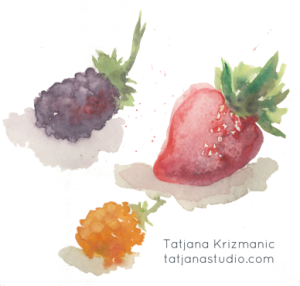Award Winning Author
Face Reading with Before & After Photos
Foods that Reduce Inflammation
Inflamed tissues signal trouble and are a marker for pain and illness. Below is a listing of the top anti-inflammatory foods, along with common sense help to avoid chronic inflammation.
But first, to better understand why some foods increase inflammation, let’s examine the nature of inflammation. Recall having a little scratch that became pink and sore. The pink, or the “flame” part of inflammation indicates there’s extra heat. You cleaned and protected the scratch from further injury and three days later, it was fully mended. No big deal.
But if your scratch remained exposed and dirty, the inflammation would progress from pink to a more full-blown fire that, if unchecked, could literally burn up the tissues and turn them to “ashes” or, more precisely, the purplish-brown color of gangrene.
Inflammation, be it interior or exterior, is manageable at low levels, but if prolonged it can lead to ill health. Chronic inflammation creates a welcome environment for bacteria and virus to thrive. It also figures in heart disease, cancer, obesity, Alzheimer’s, type 2 diabetes and all autoimmune illnesses, as well as problems like hay fever and yeast infections.
So even though you can’t see internal inflammation, you can quell the flames and support mending. Fortunately, most whole and freshly prepared fruits, vegetables and natural meats are anti-inflammatory foods.
How do you reduce your consumption of inflammatory foods? Here’s an easy technique: Note symptoms when you eat inflammatory foods. Next, compare that level of discomfort with how much better you feel when you’re eating well. From there your renewed well-being will clearly inform your future choices. See also Hay Fever Free.
Foods that Reduce Inflammation
Fruit: blueberries, cherries (sweet and sour), currants, elderberries, goji berries, grapes and pineapple
Vegetables: Beets, bok choy, cabbage, celery root, Chinese cabbage, dandelion greens, nopal (cactus), onion, seaweed (all varieties), yams and naturally fermented vegetables like kimchee and sauerkraut
Herbs, Spices and Tea: Alfalfa, bay, cardamom, cilantro, garlic, ginger, green tea, pepper (black) and turmeric
Nuts and seeds: Brazil nuts, hemp seeds and walnuts
Enjoy the above foods in a varied diet of nutritionally balanced meals and note how this healing diet supports your overall physical health and well-being.
Avoid Foods that Increase Inflammation
Conversely, there are foods that exacerbate inflammation and so, to the best of your ability, minimize or avoid the following.
Sugar
Refined cooking oils, trans fats, butter substitutes
Factory-farmed meat and processed meats
Alcohol
Baked goods including bread
Cold breakfast cereals, crackers, and packaged snack foods
Dairy products
Soft drinks
Fruit juice
Candy and all artificial sweeteners
Additives
Note: Some people with autoimmune disease find that the nightshade vegetables (potatoes, tomatoes, eggplant and peppers) are inflammatory.



Very interested in recipes/meal plans that are anti-inflammatory. I have been diagnosed with system lupus and absolutely feel you are what you eat, certain food can result in worsened symptoms, especially if you have been diagnosed with an autoimmune illness. Look forward to your reply!
For my book with anti-inflammatory meal plans and recipes, see Clean and Free. Also 95% of my recipes and articles on this page are relevant to you. Yes, you can take charge of your health!
Thank you for your offering this month about inflammation. I enjoy your monthly emails and your website very much.
There seems to be a mounting body of evidence (by Michelle Schoffro Cook, Robert O. Young and others) that suggests an alkaline eating regime (i.e. eating foods that result in an alkaline rather than acidic bloodstream) eliminates the fundamental cause of most (if not all) dis-ease, i.e. inflammation. I’d be grateful to hear your thoughts in a future newsletter or web post, if you can find the time, on this body of knowledge.
Best wishes!